Uncoupled review: Breezy stay in lobby of heartbreak hotel
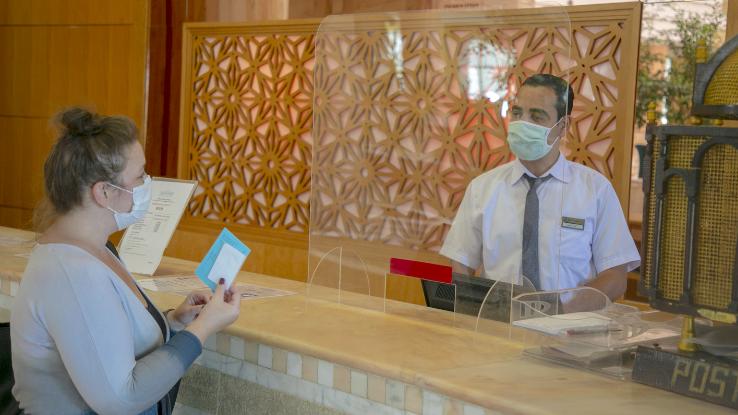
Travel plans haven't exactly been going equally expected equally the COVID-19 pandemic continues to remain a global threat. Despite the ongoing crisis, many people are still looking to savour a getaway later on months of sheltering in identify or reunite with loved ones they haven't seen for months. With health and safety in mind, it'south merely natural to wonder about the risks of booking stays at hotels or vacation rental homes. Earlier making a reservation, learn how these businesses have adjusted to the COVID-xix pandemic and implemented safety recommendations from communicable diseases experts.
Vacation Rental Hosts Are Following New Rules for Cleaning and Booking
Staying in a vacation rental can be a viable option cheers to the dissimilar precautions diverse companies take implemented. For starters, holiday rental marketplace Airbnb has prioritized health and safety during the COVID-xix pandemic. To protect guests and hosts, the company has rolled out more thorough cleaning protocols. For instance, the company'southward "Enhanced Clean program" helps hosts learn how to disinfect their homes properly, such as past using supplies recommended past the U.S. Ecology Protection Bureau. The program requires hosts to learn the new cleaning procedures, pass a quiz and consent to an testament confirming that they're going to follow the series of updated safety guidelines. Afterward completing the plan, the host receives an "Enhanced Make clean" tag and a badge on their listings for users to see.
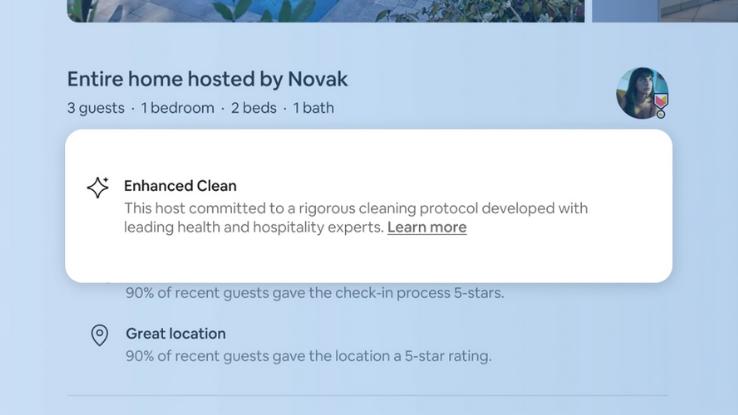
In improver to enhanced cleaning, Airbnb introduced a plan called "booking buffer," which keeps the home vacant for 72 hours between guest stays. This response aims to make visitors experience safer knowing that only the cleaning staff has been on the premises during that fourth dimension.
VRBO, another pop vacation rental company, adopted similar safety guidelines recommended by the CDC, the WHO and Cristal International Standards, a company that provides risk-management systems to hotel groups. The measures recommend that belongings partners block time between bookings, offering contactless bank check-ins, sanitize high-touch surfaces and stock homes with antibacterial hand soaps and sanitizers. According to VRBO, owners can prove users the fundamental cleaning practices they've implemented by putting the information in their belongings descriptions. The company likewise has a flexible cancellation search filter for travelers.
Vacation rental direction company TurnKey also updated its cleaning and booking processes. Before the pandemic, information technology already offered keyless locks and other means to reduce in-person contact. At present, information technology requires cleaning staff to disinfect properties using "COVID-19 fighting products." According to TurnKey, each home clean must exist "validated by photos and the cleaning products used before the job is considered complete." In this way, the company has stricter guidelines than Airbnb and VRBO.
Airbnb, VRBO and TurnKey aren't the but companies with health and safety on their minds; hotels take as well gear up up new cleaning guidelines in response to the pandemic.
Major hotel chains take adopted new rubber protocols recommended past public wellness departments and are including detailed information on their websites to reassure potential vacationers. These guidelines promote social distancing, enabling contactless cheque-in and cleaning high-bear upon surfaces with powerful disinfectants.
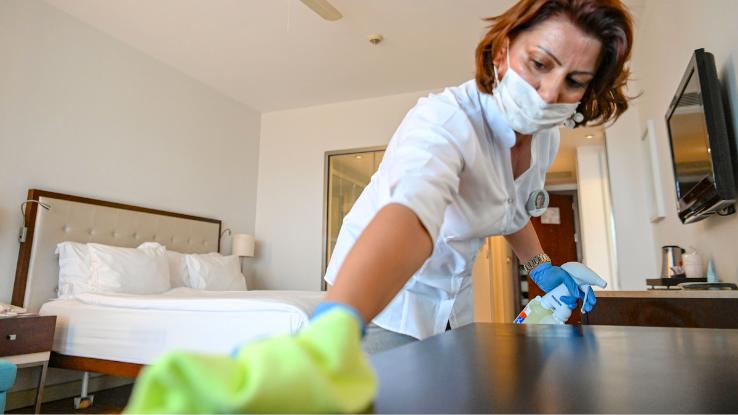
For example, Marriott is now sanitizing its hotels with CDC- and WHO-approved electrostatic sprayers. Shared surfaces and spaces are cleaned daily, while social distancing is strictly enforced. The visitor encourages guests to check in and check out online to reduce contact with others.
Meanwhile, the 4 Seasons has worked with Johns Hopkins Medicine International for its "Pb With Care" plan. Some of the plan's requirements include cleaning frequented areas hourly, limiting capacities in bars and restaurants and inspecting rooms by using black lights.
Although vacation rentals and hotels take new cleaning protocols, wellness experts say that i business organization minimizes risks more than the other.
Are Vacation Rentals Safer Than Hotels?
To determine if a hotel or holiday rental is safer for guests, health experts review the facility'south cleaning policies, mask and social distancing guidelines, and the number of people visitors are likely to come into contact with — the take chances of transmission is higher when you interact with others.
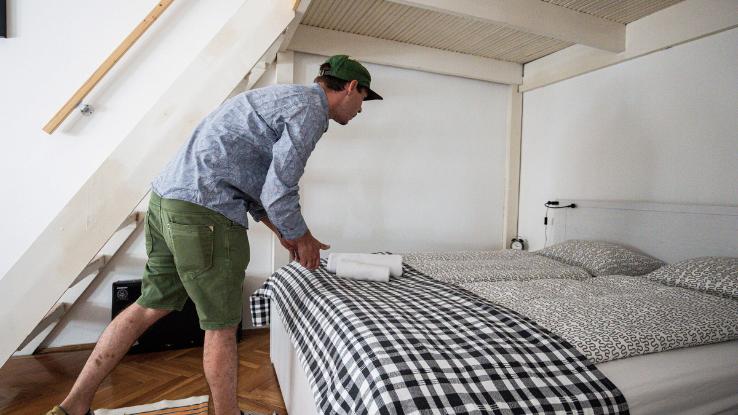
Vacation rentals have a low take chances of person-to-person contact as they offer contactless bank check-ins and reservations of entire homes. These features allow guests to accept more control over their environments. While some hotels likewise provide no-contact bank check-ins, you lot can still see people in lobbies, elevators and other public spaces.
"In a hotel, it's inevitable that yous'll take more than interactions than at an Airbnb," said Thomas Russo, caput of the infectious disease partition at the University at Buffalo. He explained, "Anything you can do to decrease your encounters with other individuals will exist safer. Or if you accept those encounters, they're at safe distances with everyone wearing masks ideally."
Ultimately, information technology'due south safer to stay in a vacation rental, merely that doesn't hateful there'due south no danger. To lower the risks of contracting the virus, Russo suggests guests "run utensils and dishware through the dishwasher when you get in that location." Wiping downwards phones, Boob tube remotes, door handles and other commonly touched surfaces with disinfectants can further reduce risks. It'due south also a good idea to launder towels and bedsheets and so you have better oversight on everything you want to clean.
John Marroni, possessor of the disaster recovery company National Restoration, advised checking for grit. If there'south dust, and so the holding's cleaning practices are questionable.
Vacation Rentals and Major Hotel Chains Take Experienced Hardships During the Pandemic
Despite enhancing cleaning measures, vacation rentals and hotels have had a hard time getting business organization during the pandemic. The UNWTO, which is the United nations' worldwide tourism agency, constitute that 2020 was the worst year in tourism history "due to an unprecedented fall in demand and widespread travel restrictions."
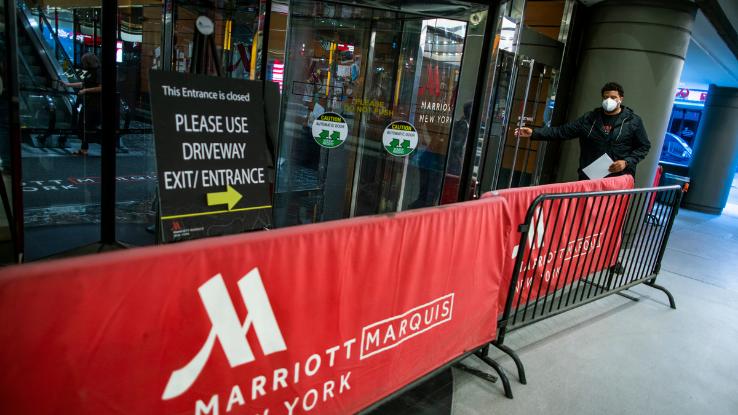
While many rental holding hosts and major hotel bondage are struggling, there are some positive signs for the vacation rental manufacture. Airbnb and VRBO hosts in remote areas have seen a rise in bookings. In fact, The New York Times reported that 30% of Airbnb's Labor Day bookings in 2020 were in remote areas, which was double the amount from the aforementioned weekend in 2019.
According to CNBC, Americans have been flocking to rural vacation rentals to escape cabin fever and stress from COVID-19. Remote backdrop are not only filled on weekends but also on weekdays. Guests who are concerned near their power to keep social distancing are largely choosing these remote holiday homes as a safeguard.
Although hotels and vacation rentals have adopted many new policies to ensure healthy environments, guests must also practise their function to continue everyone safe — and that doesn't just mean choosing a remote belongings for vacation. Thankfully, there are simple steps visitors can take to minimize risks further.
If you lot're planning to stay in a hotel or Airbnb, these recommendations can likewise help y'all stay safe:
- Wear a confront covering in public spaces and any time you're around people who don't share your household. The CDC recommends wearing a two- or three-layer fabric mask that covers both your rima oris and olfactory organ.
- Request contactless check-in and check-out. Find out if your hotel or holiday rental service has an app you lot can use to complete these processes without visiting a front end desk or interacting with a property owner.
- Check the belongings's space for cleanliness when yous arrive. Make sure the h2o spectacles are in sealed wrappers, and see if at that place's a paper strap around the toilet seat. Expect for fingerprints and smudge marks on faucets, doorknobs and handles. Come across if at that place's dust around — and don't be agape to do a sniff test. If the room smells like cleaning products, it's likely clean.
- Bring your own wipes to clean the infinite. Review this infographic from the Environmental Protection Agency to larn which products to employ and how to use them properly.
- If you lot're experiencing any symptoms of illness, stay home. Get tested for COVID-19 if possible, and quarantine yourself for 14 days if you've come up into contact with a person who has COVID-19.
Every bit a reminder, it's of import to prioritize your health and safety when you're traveling during the pandemic. The best way to keep anybody prophylactic is to practice proper hygiene and minimize contact. If possible, search for properties with flexible cancellations, just in case you alter your listen or start feeling ill.
Source: https://www.ask.com/lifestyle/safer-stay-hotel-vacation-rental-during-pandemic?utm_content=params%3Ao%3D740004%26ad%3DdirN%26qo%3DserpIndex&ueid=57fcbbfa-06cb-48f6-91d9-ecf987554094
Posted by: armsteadanclund.blogspot.com

0 Response to "Uncoupled review: Breezy stay in lobby of heartbreak hotel"
Post a Comment